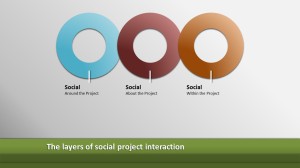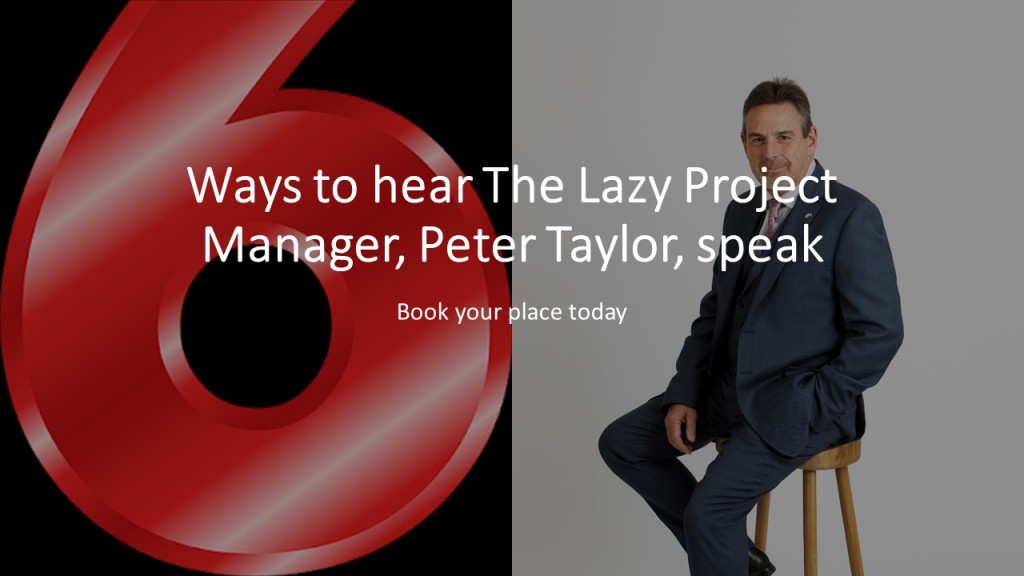The Social Project Manager
Balancing Collaboration with Centralised Control in a Project Driven World
We human beings are social beings.
We come into the world as the result of others’ actions. We survive here in dependence on others.
Whether we like it or not, there is hardly a moment of our lives when we do not benefit from others’ activities.
For this reason, it is hardly surprising that most of our happiness arises in the context of our relationships with others.
Dalai Lama
Social project management is a non-traditional way of organising projects and managing project performance and progress aimed at delivering, at the enterprise level, a common goal for the business but harnessing the performance advantages of a collaborative community.
There is a paradigm shift ongoing in many organisations that is all about finding a practical balance between the challenges to traditional project management made by what is known as Project Management 2.0 – which encouraged a move away from centralised control of projects and instead promoted the value of team collaboration – and the practical recognition that large scale projects do require a stronger form of centralised control and governance.
It is this balance, if correctly made, that will take the best of both worlds and move project management into the highest levels of performance and achievement, into the world of the social project and therefore the world of the Social Project Manager.
Naturally the starting point for conversation around social project management is with the project management role itself; what does this specifically mean for any project manager, what should they think about, and should they adjust their behaviour? But let’s expand this thought process to the project team as a whole and consider how such social tools impact the team performance.
Thought: I believe that all project team members, including the project manager, who welcome any approach that reduces the amount of time invested (and for the greater part wasted) in meetings.
Add to that the ever-present challenge to project managers of getting true commitment to the project goals from contributors then an approach that achieves this will also be welcomed.
If we consider the world of the project team, of which the project is part of course but also a separate entity in itself – and one that can be constantly in flux throughout the project lifecycle with team members coming and going, joining the team with their skills and time and then leaving to return to their ‘business as usual’ roles and responsibilities.
Thought: If you have ever managed a project for any significant length of time I am sure you will recognise, as I do, that the project becomes a ‘being’ in itself and takes on a ‘life’ within the organisation and project community.
As such the concept of communicating ‘to the project’ is one that I personally find logical, it becomes in many ways ‘one of the team members’.
I feel we can think of the communication as at three levels, all interacting with each other and crossing boundaries – social means fewer boundaries after all so perhaps we should say ‘without boundaries’ – but to understand the types or themes of project conversations then the diagram below might help:
I describe these as the three elements of ‘social’ project communication – and it is critical to empower all three and provide a seamless flow of engagement, interaction, conversation, and idea generation, decision making and team-building through all channels.

Considering ‘social within project’
Beginning with social within project then this is the communication about the project components, the tasks, the activities, the challenges and the team members themselves, the mechanics of meetings and reports and briefings, together with the deliverables and benefits.
Everything that is to do with the project lifecycle and the end goals of the project.
When is ‘A’ required? What will happen if ‘X’ happens? Can we get help from someone on ‘Y’? Are we going ahead with ‘B’? What did we learn from ‘C’? And so on.
Here the social project management team engages with each other to share knowledge and update each other on progress, seek assurance and help, encourage and congratulate, solve problems and celebrate achievements. It should be a self-regulating activity with the team contributing and providing knowledge and wisdom to each other, it is when the sum of the parts is definitely greater that the whole.
This ‘team’ will include the project itself based on the previous insight that the project becomes itself is a “member of the project”, with whom other project members can communicate, and who can communicate with other project members.
Collective purpose is shared and reinforced through this social within project communication and, as we have seen, by using a social project management activity stream and project-centric communication, the feedback about what is going on with the project becomes nearly constant which adds to the value of this type of project communication.
Considering ‘social about project’
I noted in another of my books ‘Project Branding’[1] that ‘I learned something very important a long time ago, when I first started out in project management: no matter how good a job you do, if you don’t let people know, then most people just won’t know!’ and I went on to advise that ‘The art of project marketing is to ensure that your project is understood, expected, appreciated, welcomed, and supported within its organizational home (and, if relevant, the wider community of stakeholders. Such acceptance is crucial to long-term success, since this is where the project deliverables will eventually be implemented, once the project has been completed. Project marketing is the proactive process of educating all stakeholders about the value of your project deliverables in order to aid successful delivery and acceptance.’
Social about project is this very world of project marketing and perhaps even project branding which is the purpose and process of ensuring that your project is well known (for good reasons) and is well understood, together with the right levels of expectations set for the widest community of stakeholders.
Considering ‘social around project
Think of your own working day, today or yesterday – it doesn’t matter. Now think about how much of the day, at the start over your first coffee, when you bumped in to so and so at the water cooler, at the start of that meeting with the team from the other building, or when you joined that conference call with the remote users… how much of that time was spent in talking about non-project matters? Non-work matters actually. How many minutes during each event and how many hours in the day?
This doesn’t make you a bad working or lazy, it makes you human. Human to human interaction is social in its very nature.
Humans are in fact highly social beings. We all like to be surrounded by friends and family and co-workers and we all valuing being able to share our own personal experiences with others, and to hear what others wish to share with us in return. In fact the recent appearance of all of the various social tools, and their incredibly rapid adoption illustrates the fundamental desire for social belonging and interpersonal exchange.
Therefore it has to accepted that whatever ‘project’ or ‘business’ orientated social tools that you provide will also be used (hopefully respectfully) for ‘around project’ social communication and this is actually a good thing.
It helps bond team members (we will see this in the later section around remote and virtual teams) and adds an honest ‘human’ aspect to the communication. This in turn can only aid the project.
Therefore, looking at these three elements of ‘social’ project communication, I believe that the best social project managers, the ones who understand the value and potential of this new social world, will be the ones that combine these elements into one cohesive communication experience.
To a degree it is a leap of faith and perhaps very different from how project managers have gone about the job in the past.
Thought: One of the significant issues that I uncover which project managers who have only just started on the project management journey is the bad practice of channeling as much communication as possible through themselves, thereby creating a bottleneck for decision making and an unnecessary burden to the time of the project manager
It is a time of change and, as discussed, there is a paradigm shift ongoing with a move away from centralised control of projects and a rise in the value of team collaboration for many organisations and therefore project managers.
It is about taking the best of both the traditional project world and the opportunity of the new social project world, the world of the Social Project Manager.

The Social Project Manager, Balancing Collaboration with Centralised Control in a Project Driven World Dec 2015, Gower (Peter Taylor)
Peter Taylor is a PMO expert currently leading a Global PMO, with 200 project managers acting as custodians for nearly 5,000 projects around the world, for Kronos Inc. – a billion dollar software organisation delivering Workforce Management Solutions.
Peter Taylor is also the author of the number 1 bestselling project management book ‘The Lazy Project Manager’, along with many other books on project leadership, PMO development, project marketing, project challenges and executive sponsorship.
In the last 4 years he has delivered over 200 lectures around the world in over 25 countries and has been described as ‘perhaps the most entertaining and inspiring speaker in the project management world today’.
His mission is to teach as many people as possible that it is achievable to ‘work smarter and not harder’ and to still gain success in the battle of the work/life balance.
More information can be found at www.thelazyprojectmanager.com – and through his free podcasts in iTunes.
[1] Project Branding: Using Marketing to Win the Hearts and Minds of Stakeholders; Nov 2014, RMC Publications, Inc (Peter Taylor)
















